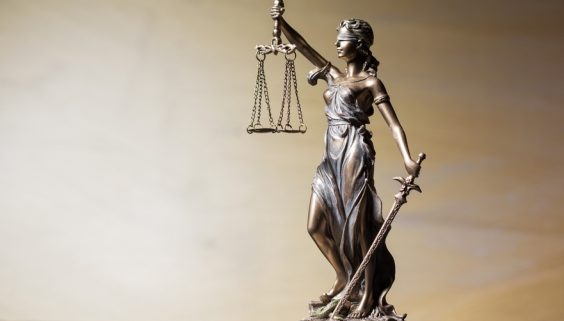News
State Bar asks CA Supreme Court for bailout
 Photo illustration of Lady Justice. (Kaspars Grinvalds)
Photo illustration of Lady Justice. (Kaspars Grinvalds) Blocked by lawmakers at the 11th hour and facing a fiscal emergency, the State Bar of California has gone directly to the state Supreme Court seeking authority to levy dues on thousands of attorneys.
The Bar, which filed the request Friday, said it would go out of business early next year without the money generated by the dues. The Bar has about 500 employees and an annual budget of $146.1 million.
The Bar asked the Supreme Court to approve its request by November, which would allow the Bar to send out dues notices to the attorneys the following month.
Absent the court’s intervention, the State Bar said it “will be without the necessary revenue to continue beyond early next year.” The Bar asked for authority to require active attorneys to pay $315 each in annual dues. There are about 186,000 active practicing attorneys in California, and thousands more who are not active and who pay dues at a reduced level.
State Supreme Court Chief Justice Tani G. Cantil-Sakauye has said she supports the Bar but has given no indication whether the court would approve the increase request.
The agency, formed in 1927, is responsible for protecting the public against unethical lawyers, licenses attorneys to practice in the state, makes recommendations on judicial appointees and regulates the legal profession as an arm of the state Supreme Court, among an array of programs.
Of the Bar’s budget, the money generated by dues represents far less than half, but it is crucial for its disciplinary system.
“The absence of State Bar funding presents a substantial risk” to programs protecting the public, the Bar told the high court. “The lack of a functioning disciplinary system places the public, the integrity of the legal profession and the interest of the courts all at great risk. The lack of funding also threatens the employment security of the State Bar work force…”
The Bar asked the Supreme Court to approve its request by November, which would allow the Bar to send out dues notices to the attorneys the following month.
Controversy over the Bar’s dues-collecting power is not new in the Capitol, although the Legislature’s lack of action this year marked the first time that lawmakers have declined to authorize the dues. Legislators involved in the negotiations complained about the Bar’s disciplinary performance track record, its fiscal stewardship and a failure to compensate victims in a timely manner.
A state auditor’s report showed a backlog of complaints that allowed some lawyers to continue practicing even though they should have been disciplined or removed from the profession.
The May audit found that the bar had a backlog of 5,500 applications for restitution from victims of attorney misconduct and a shortfall of more than $16 million to pay the claims. Some victims wait as long as five years for payment, which is provided through the attorneys who have been disciplined.
Some 990 California lawyers were disciplined and 421 were disbarred or suspended in 2015, according to the Bar’s annual discipline report, which was completed in April. The Bar said it received 15,796 complaints about attorneys.
In Oct. 1997, then-Gov. Pete Wilson, a Republican, vetoed the Bar dues bill, a move that threw the agency into turmoil and forced layoffs. The state Supreme Court intervened, approving dues collection and setting up a monitor of the Bar’s operations.
But Bar Executive Director Elizabeth Rindskopf Parker earlier told Capitol Weekly’s Lisa Renner in an interview that she was confident layoffs won’t be necessary.
“Obviously I would have preferred a bill,” she said. “This is obviously very upsetting to employees who worry we may repeat the very difficult 1998 year. But given the strong support we’ve had from the court we should be able to move forward on a steady keel.”
Want to see more stories like this? Sign up for The Roundup, the free daily newsletter about California politics from the editors of Capitol Weekly. Stay up to date on the news you need to know.
Sign up below, then look for a confirmation email in your inbox.

The California Supreme Court only request the necessary funds for the for its discipline system and cited the In Re Attorney Discipline System (1998) 19 Cal th 582 at 607,
I find it that once again the State Bar seeks to violate the Separation of Power between the legislature and the courts.